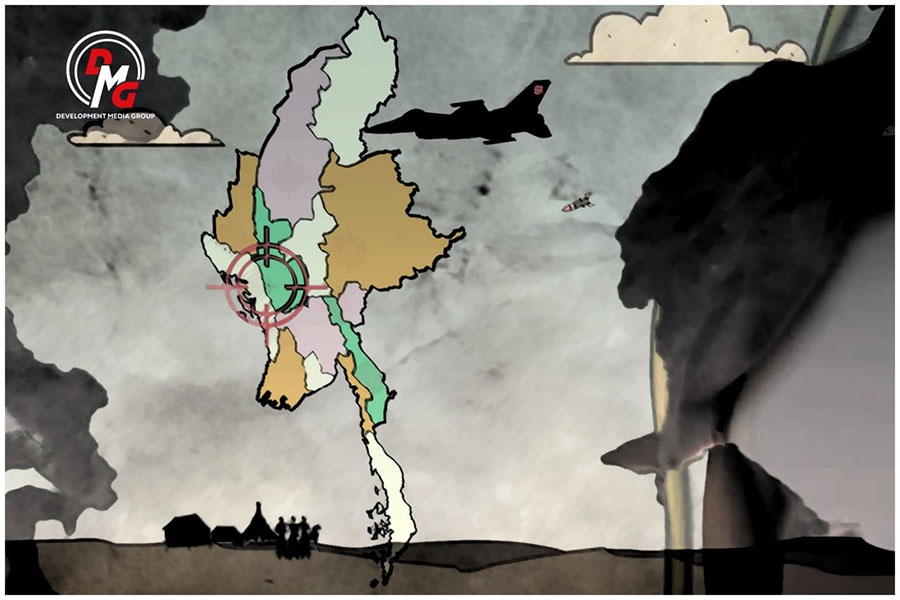- Junta claims over 24 million ballots cast in 2025 poll, cites strong youth turnout
- ULA expands HIV prevention, healthcare services for sex workers in AA-held areas
- Over 600 Mro villagers displaced in Maungdaw amid threats from ARSA, RSO
- Clashes continue in Sittwe as junta reinforces naval, armored deployment
- Arakan Army signals willingness to forge strategic partnership with Bangladesh’s new government
Editorial: Jet Fuel and Weapons Sales = War Crimes Complicity
Foreign nations' continued sale of aviation fuel and weapons to the Myanmar regime are tantamount to complicity in the war crimes being perpetrated by the junta on a near-daily basis.
10 Oct 2024

Following the failure of its ground forces to quell the popular armed revolt prompted by the February 2021 coup, Myanmar's military regime has turned to its Air Force to contain the resistance advances.
Though the junta's aerial campaign appeared initially to target the bases of ethnic armed organisations, it later turned its sights on residential areas, apparently venting its anger on the civilian populations suspected of supporting the uprising.
According to observers monitoring the junta's aerial attacks since the coup, targets include the ethnic armed resistance organisations, People's Defence Forces (PDFs) and civilian populations. There is no clear indication as to whether any of those targets take precedence in the eyes of the regime, but it is indisputable that targeting the latter of the three constitutes war crimes.
Consequently, those who provide material support for this campaign, for example by continuing to supply aviation fuel to the regime, are complicit in said war crimes.
Earlier this year, Amnesty International documented the matter well, but it bears repeating: Foreign nations' continued sale of aviation fuel and weapons to the Myanmar regime are tantamount to complicity in the war crimes being perpetrated by the junta on a near-daily basis.
By one accounting, the regime has lost control of 81 of Myanmar's 330 townships. It now uses warplanes to drop bombs on many of these townships - and their civilian inhabitants - with reckless abandon.
Residential areas controlled by anti-regime groups have become a top junta target. In justifying this campaign of terror, it clings only to the fact that those areas are now occupied by the armed groups that oppose its undemocratic claim to governing authority over the nation's people.
The regime has not spared religious buildings, schools, healthcare facilities or displacement camps in its increasingly frequent air attacks on towns and villages.
The Myanmar military carried out 820 air raids across 12 of the country's 14 regions and states from May to August of this year, with an average of seven air attacks per day, according to the independent research group Nyan Lynn Thit Analytica. Arakan State suffered 176 air attacks, the highest among the 12 regions and states targeted.
According to a DMG tally, more than 40 civilians were killed or injured by the junta's air raids in Arakan State in August alone. The number of casualties nearly doubled to 80 in September.
That included 14 civilians killed, children among them, as well as 25 others injured on September 26 when two junta jet fighters bombed the Thandwe town hall and environmental conservation department office there, where displaced people were taking refuge.
The Myanmar regime has resorted to an aerial campaign because this strategy is among the only true advantages it has over its many enemies at this point. The goal is to prevent resistance forces from installing administrative apparatuses in territories it has lost control of, and to undermine public faith in the capacity of anti-junta forces to govern local populations - including and importantly, keeping these populations safe. In the words of one observer, the regime is "attempting to destroy the territories it can't hold any longer."
The junta's relentless air raids have taken many lives. Children, women and the elderly are among the most vulnerable, and are being killed on a daily basis. The attendant destruction of property is also an important metric by which to gauge the regime's callous cruelty. Generational wealth, as well as subsistence existences, can and do go up in flames, often in a matter of seconds.
Imported aviation fuel is a critical component of this tyranny, and it is incumbent upon those foreign nations supplying the regime to look critically at the moral implications of their continued role in this increasingly heartbreaking saga.
Among many other aspirations, Myanmar's people want to live lives in which they do not fear death from above. The ongoing sales of aviation fuel and weapons to the regime are objectively preventing this from happening.







.jpg)












